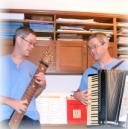Now we know; now we know...
You know how it is when you're trying to sleep and there's a bright light shining on you that makes it hard to sleep? Gosh I hate that.
Well get this - if you live somewhere where there are bright lights shining on you, it just may actually be hard to sleep! But don't worry - this is science from News that Vexes, so we're not totally sure about it. I don't want to get ahead of the news though, so hang on...
First the breaking news:
Light Pollution May Trigger Insomnia
Now let's look at the science. Literally the first sentence is:
People who live in neighborhoods that are lit up at night with neon signs and streetlights are more likely to report sleep problems, new research suggests.
Awesome, I love bright shiny new research. This time it's from actual real scientist Dr. Maurice Ohayon from the Stanford Sleep Epidemiology Research Center, which is a real thing. Drop him a note to congratulate him here for making it on News that Vexes: mohayon@stanford.edu
Also, in the spirit of true cash-squandering boondogglery, he'll be presenting this research at the Convention Center in beautiful downtown Vancouver Canada on April 15-21, 2016. Maybe tickets are still available!
Here are some more choice tidbits:
“Exposure to light at night can have powerful biological and behavioral consequences,”said George Brainard, a professor of neurology and neuroscience at Thomas Jefferson University in Philadelphia, who called the Stanford team’s analysis an “important epidemiological study.” (Is he getting some kind of kickback or something?)
YES, WE GET IT - BRIGHT LIGHTS AT NIGHT MAKE IT HARD TO SLEEP!
But check out this bold assertion by this Brainard guy again:
“Do I think that light is part of the culprit? Absolutely, I do,” Brainard said.Whoa whoa whoa, simmer down now Dr. Brainard! I beg you, please tell me there are some caveats before I believe this far-fetched nonsense:
Although the study doesn’t prove cause-and-effect, the scientists believe that intense outdoor illumination in the evening interferes with quality of sleep.Thank you. I thought for a second there you were trying to tell me you were certain annoying lights at night are actually annoying. Much more study is in order, perhaps to present at conferences in Hawaii or New Zealand or Paris?
We can't fault these guys for not being thorough:
Those exposed to higher light levels also were more likely to report fatigue, wake up confused during the night, and have excessive sleepiness and impaired functioning.Almost like they didn't sleep well the night before with all the bright lights shining on them. But I should keep my mouth shut, I'm no scientist.

